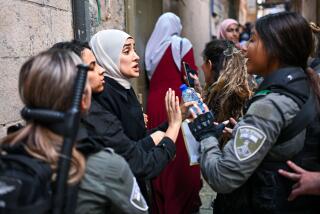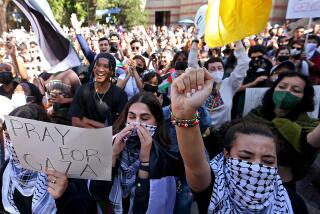Anger Vies With Calls for Calm
- Share via
BAGHDAD — Tensions remained high across Iraq on Friday as security was tightened around mosques on the Muslim day of worship amid fraying relations between Iraq’s Shiites and Sunni Arabs.
But a measure of placidity returned to the streets, where at least 120 Iraqis were killed in suicide bombings Thursday, as clerics delivered sermons tinged with notes of defiance as well as calls for calm.
Meanwhile, U.S. officials raised the American death toll from Thursday’s violence to 11, saying four more military personnel had been killed in insurgent attacks. The massive suicide bombings took place outside a Shiite Muslim shrine in Karbala, south of Baghdad, and a police recruiting center in Ramadi, a Sunni Muslim-dominated city west of the capital. At least 175 Iraqi civilians, police and soldiers as well as U.S. military personnel were killed during the three-day period ending Friday, one of the bloodiest intervals since the March 2003 U.S.-led invasion.
The 11 Marines and soldiers died in five separate incidents. A roadside bomb south of Baghdad resulted in the deaths of five U.S. soldiers on patrol. Two others were killed when their patrol struck a roadside bomb in Baghdad. Two Marines were killed by small-arms fire during separate combat operations in Fallouja, near Ramadi, U.S. officials announced. And a Marine and a soldier were among those killed in the suicide bombing at the recruiting center in Ramadi. More than 2,180 American troops have been killed since the war began, according to figures compiled by Associated Press.
The uptick in violence came as Iraq’s factions tried to put together a new four-year government in the wake of the Dec. 15 parliamentary elections. Army Gen. George W. Casey, commander of U.S. forces in Iraq, downplayed the trend as anomalous.
“These attacks of the past days, I believe, have been intended by the foreign fighters and the Iraqis that are supporting them to foment sectarian tension during a vulnerable period of the formation of the government,” Casey said in a television interview broadcast on CNN. “But I don’t think it’s on the brink of civil war.”
His predecessor, Lt. Gen. Ricardo S. Sanchez, differed, telling soldiers in Germany preparing to leave for Iraq that the country was “on the verge of a civil war,” the Stars and Stripes newspaper reported.
Observers said they had detected new hints of chauvinism and anger among Shiite clerics, who have been key to maintaining relative calm among the country’s majority and averting an all-out civil war.
“Today, we are much stronger than we were yesterday,” said Imam Sadruddin Qubanchi, Friday prayer leader at the shrine of Imam Ali in the Shiite holy city of Najaf, where security was ramped up after the bombings Thursday.
“We have a state, constitution, civil establishments,” he said. “The terrorism only increases our persistence and commitment to this path.” Worshipers, overflowing from the mosque out into the street, chanted, “We shall not surrender to misery.”
Iraq’s Shiites have emerged as the dominant force in post-invasion Iraq after centuries at the bottom of the nation’s social and political hierarchy. In grappling with an insurgency led by Sunni nationalists, who held sway under former President Saddam Hussein, and foreign Islamic extremists, Shiites are accused of having begun to allow the country’s police force to use death squads and torture against Sunnis, according to human rights organizations and U.S. officials.
American military commanders and embassy officials say the Iraqi police force, suspected of being infiltrated by Shiite militiamen, is destabilizing the country. The U.S. commanders have pledged to reform it this year by pushing for the removal of Interior Minister Bayan Jabr and turning the police into a force that draws Sunni Arab recruits as well as Shiites and Kurds.
But Shiite leaders pointed to the recent bombings, including the attack on the Imam Hussein shrine in Karbala and one a day earlier at a Shiite funeral in Muqdadiya, to deflect criticism of the government’s security policies.
“The multinational forces and the American Embassy adopted attitudes that encourage terrorists to use terrorism,” Jalaluddin Saghir, a Shiite cleric and parliamentarian who leads prayers at Bratha Mosque in Baghdad, told worshipers, who chanted, “We will never be humiliated.”
Echoing earlier statements made by his political chief, Abdelaziz Hakim, Saghir accused the U.S. of “creating tension in the political atmosphere by pretending to be weeping for human rights and supporting the claim that the minister of interior is a sectarian minister.”
In Baghdad’s mostly Shiite districts of Sadr City and Kadhimiya, thousands of supporters of the main Shiite political party rallied against the insurgent attacks and what they called U.S. efforts to back Sunni militants.
“No, no to [U.S. Ambassador] Zalmay [Khalilzad],” the demonstrators chanted. “No, no to terrorism.”
Security cordons in the capital were tightened at Sunni and Shiite mosques alike. Two mortar rounds fell on a Sunni mosque in Baghdad, but there were no injuries.
Iraqi national guardsmen were stationed around Baghdad’s Abu Hanifa Mosque, among the most important Sunni places of worship and study in Iraq. The few worshipers who attended prayers Friday listened somberly as prayer leader Sheik Ahmad Taha condemned both the Sunni-led insurgents and the Shiite-led government of transitional Prime Minister Ibrahim Jafari for raising sectarian tensions.
“The indiscriminate bloodshed of innocent Iraqi people is against all the principles of mankind,” Taha said. “We hold the Iraqi government responsible for the chaos in the streets. We see the prime minister appearing on television without admitting any of his mistakes.”
Also Friday, a suicide bomber struck a police patrol in the capital, killing one officer and injuring four. Another suicide bomber struck a police checkpoint in the northern city of Mosul, injuring 15 people, police said.
Times staff writers Caesar Ahmed and Raheem Salman in Baghdad, special correspondent Saad Fakhrildeen in Najaf and Times wire services contributed to this report.
More to Read
Sign up for Essential California
The most important California stories and recommendations in your inbox every morning.
You may occasionally receive promotional content from the Los Angeles Times.










